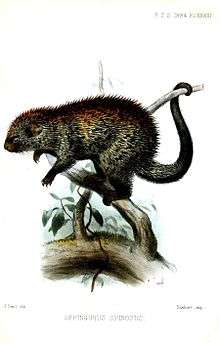Paraguaian hairy dwarf porcupine
The Paraguaian hairy dwarf porcupine, Coendou spinosus, is a South American porcupine species from the family Erethizontidae.[2] It is found in Argentina, Brazil, Paraguay and Uruguay.
| Paraguaian hairy dwarf porcupine | |
|---|---|
 | |
| Scientific classification | |
| Kingdom: | Animalia |
| Phylum: | Chordata |
| Class: | Mammalia |
| Order: | Rodentia |
| Family: | Erethizontidae |
| Genus: | Coendou |
| Species: | C. spinosus |
| Binomial name | |
| Coendou spinosus (Cuvier, 1822) | |

Taxidermized specimen at the Museo Civico di Storia Naturale di Genova
They have a short tail and gray brown quills and feed on fruits, ant pupae, vegetables and roots.
This species was formerly sometimes assigned to Sphiggurus,[2] a genus no longer recognized since genetic studies showed it to be polyphyletic.[3] The population formerly recognized as the orange-spined hairy dwarf porcupine (Sphiggurus villosus)[4] has been reclassified to this species.[1] Its closest relatives are the bicolored-spined porcupine (Coendou bicolor) and the black dwarf porcupine (Coendou nycthemera).[3]
References
- Roach, N.; Naylor, L. (2016). "Coendou spinosus". IUCN Red List of Threatened Species. 2016: e.T20630A22213974. doi:10.2305/IUCN.UK.2016-2.RLTS.T20630A22213974.en.
- Woods, C.A.; Kilpatrick, C.W. (2005). "Infraorder Hystricognathi". In Wilson, D.E.; Reeder, D.M (eds.). Mammal Species of the World: A Taxonomic and Geographic Reference (3rd ed.). Johns Hopkins University Press. pp. 1538–1600. ISBN 978-0-8018-8221-0. OCLC 62265494.
- Voss, R. S.; Hubbard, C.; Jansa, S. A. (February 2013). "Phylogenetic Relationships of New World Porcupines (Rodentia, Erethizontidae): Implications for Taxonomy, Morphological Evolution, and Biogeography" (PDF). American Museum Novitates. 3769 (3769): 1–36. doi:10.1206/3769.2.
- Woods, C.A.; Kilpatrick, C.W. (2005). "Sphiggurus villosus". In Wilson, D.E.; Reeder, D.M (eds.). Mammal Species of the World: A Taxonomic and Geographic Reference (3rd ed.). Johns Hopkins University Press. pp. 1538–1600. ISBN 978-0-8018-8221-0. OCLC 62265494.
- John F. Eisenberg and Kent H. Redford, 2000. Mammals of Neotropics: Ecuador, Bolivia and Brazil.
This article is issued from Wikipedia. The text is licensed under Creative Commons - Attribution - Sharealike. Additional terms may apply for the media files.
